英语中的常见六大疑问词的用法
2020年英语中的常见六大疑问词的用法

作者:空青山作品编号:89964445889663Gd53022257782215002时间:2020.12.13英语中的常见六大疑问词的用法who whose where when what how这六个词的常见用法(指的是一般情况下的用法,除特殊外)1.回答中有“物”,就用what 来提问;2.回答中有“地方,地点”,就用where来提问3.回答中有“方式,方法”,就用how来提问4.回答中有“人”,就用who来提问5.回答中有“人的所有格”,就用whose来提问6.回答中有“时间”,就用when来提问以上这六种里最简单的为第四个。
就刚才所说六点现在举例说明如下:1. (What) are you going to take?2. (Where) are you from?Sandwiches,milk and cakes. I am from New York.3. (How) did you get there?4. (Who)is going to help me?I got there by train . Mike.5. (Whose) bag is this?6. (When) are you going to watch TV?Mike's bag is this. At eight o'clock.英语疑问词用法总结句子是英语学习的核心。
从句子使用的目的来分,它可分为四类1、陈述句(肯定句和否定句)2、疑问句(一般疑问句、特殊疑问句和选择疑问句)3、祈使句(肯定句和否定句)4、感叹句。
四大句子类型的相互转换,对于学生来讲是个难点,为此,可通过说顺口留的形式来帮助学生解决这一难题。
如:将陈述句变成一般疑问句,可以变成这样的顺口留:疑问疑问调个头,把be(系动词“is are am”)放在最前头。
又如:将陈述句的肯定句变成否定句,我们就可以这样说:否定,否定加“not”,加在何处,加在系动词的后面;在句子相互转换的题型中,最难的要算“就下列划线部分提问”或是“看答句,写问句”这种题型了,其实,我们只要熟练掌握疑问词(what,what time, what colour, where,when, who,whose,which,how,how old ,how tall, how long, how big, how heavy , how much,how many等等)具体用法,了解他们是针对什么提问的,这种题型就很容易做了。
(完整版)英语疑问词what,how,who,why,where,when的用法

英语疑问词what,how,who,why,where,when的用法。
what什么用来问是什么,叫什么,做什么等1。
What’s your name?你叫什么名字?2. What’s your father?你爸爸是干什么的?3.What is in your box?你的盒子里是什么?What time什么时间用来问时间What time is it? 几点了?What time is it now?现在几点了?What colour什么颜色用来问颜色1.waht colour is your bag? 你的书包是什么颜色?2.what colour is your book?你的书本是什么颜色?What about怎么样用来征求意见或询问感受等,大多用于承接上面的同样问题1.what bout this pair of shoes?这双鞋子怎么样?2。
what about you? 你呢?3.what about your dad?你爸爸呢?What day星期几用来问星期几1。
what day is it today?今天星期几?2。
what day was yesterday? 昨天星期几?What date什么日期问具体的日期1.What’s the date today? 今天是几号?2. what date is tomorrow? 明天是几号?What …for为何目的用来问目的,在一定情况下只可以与why互换What did you buy that for? 你为什么要买那个?when什么时候用来问时间1。
when do you get up?你什么时候起床?2。
when did you go there?你什么时候去的那里?where哪里用来问地点1。
where is my ruler? 我的尺子在哪里?2。
where are you from?你是哪里人?3。
where are you going to ?你打算去哪里?which哪一个用来问具体的哪一个1。
英语疑问词的用法
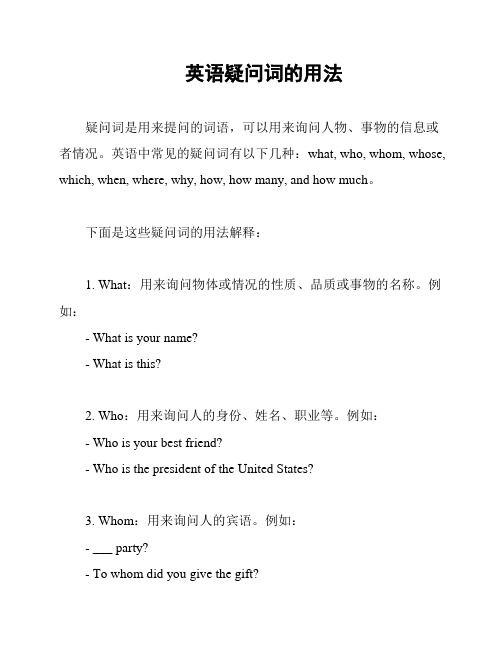
英语疑问词的用法疑问词是用来提问的词语,可以用来询问人物、事物的信息或者情况。
英语中常见的疑问词有以下几种:what, who, whom, whose, which, when, where, why, how, how many, and how much。
下面是这些疑问词的用法解释:1. What:用来询问物体或情况的性质、品质或事物的名称。
例如:- What is your name?- What is this?2. Who:用来询问人的身份、姓名、职业等。
例如:- Who is your best friend?- Who is the president of the United States?3. Whom:用来询问人的宾语。
例如:- ___ party?- To whom did you give the gift?4. Whose:用来询问物体或人的所有者。
例如:- Whose car is this?- Whose book are you reading?5. Which:用来询问从几个选项中选择一个。
例如:- Which color do you prefer?- Which school did you go to?6. When:用来询问时间。
例如:- When is your birthday?- When did you arrive?7. Where:用来询问地点或位置。
例如:- Where do you live?- Where is the nearest grocery store?8. Why:用来询问原因或目的。
例如:- Why are you crying?- Why did you go to the park?9. How:用来询问方式、方法、程度等。
例如:- How do you spell your name?- How much does it cost?10. How many:用来询问数量(可数名词)。
初中英语知识点归纳疑问词的用法和提问方式
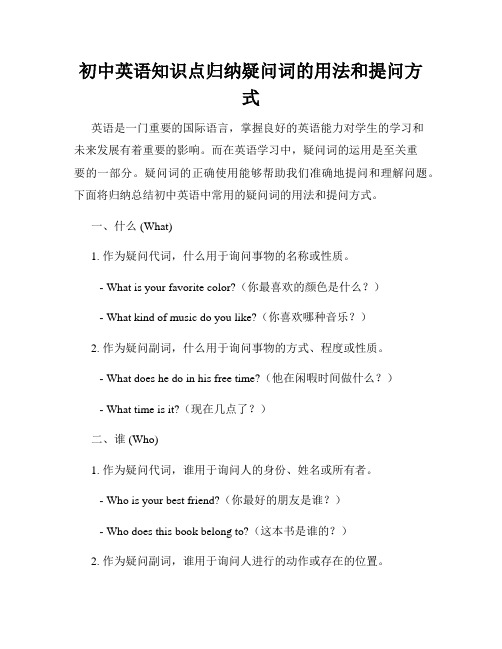
初中英语知识点归纳疑问词的用法和提问方式英语是一门重要的国际语言,掌握良好的英语能力对学生的学习和未来发展有着重要的影响。
而在英语学习中,疑问词的运用是至关重要的一部分。
疑问词的正确使用能够帮助我们准确地提问和理解问题。
下面将归纳总结初中英语中常用的疑问词的用法和提问方式。
一、什么 (What)1. 作为疑问代词,什么用于询问事物的名称或性质。
- What is your favorite color?(你最喜欢的颜色是什么?)- What kind of music do you like?(你喜欢哪种音乐?)2. 作为疑问副词,什么用于询问事物的方式、程度或性质。
- What does he do in his free time?(他在闲暇时间做什么?)- What time is it?(现在几点了?)二、谁 (Who)1. 作为疑问代词,谁用于询问人的身份、姓名或所有者。
- Who is your best friend?(你最好的朋友是谁?)- Who does this book belong to?(这本书是谁的?)2. 作为疑问副词,谁用于询问人进行的动作或存在的位置。
- Who is singing in the next room?(谁在隔壁唱歌?)- Who is at the door?(门口有谁?)三、哪个/哪些 (Which)1. 作为疑问代词,哪个/哪些用于在一定的范围内进行选择。
- Which color do you prefer, red or blue?(你更喜欢哪种颜色,红色还是蓝色?)- Which team won the game?(哪个队赢了比赛?)2. 作为疑问副词,哪个/哪些用于询问具体的事物或人。
- Which book are you reading?(你在读哪本书?)- Which countries have you visited?(你去过哪些国家?)四、何时/什么时候 (When)1. 作为疑问副词,何时/什么时候用于询问具体的时间或时间点。
初中英语知识点归纳疑问词的用法

初中英语知识点归纳疑问词的用法疑问词(Interrogative Words)是用来引导疑问句的词语,用于询问特定的信息。
在初中英语学习中,熟练掌握疑问词的用法对于提高语言表达能力和理解能力至关重要。
本文将对常见的疑问词及其用法进行归纳总结。
一、疑问词的分类疑问词可以分为以下几类:1. 定义疑问词:what、which2. 人称疑问词:who、whose、whom3. 时间疑问词:when、how long、how soon4. 地点疑问词:where、whence5. 方式疑问词:how6. 原因疑问词:why、how come7. 数量疑问词:how many、how much8. 选择疑问词:either、or、neither、nor9. 反意疑问词:isn't it、aren't you、don't you10. 程度疑问词:how、to what extent11. 频率疑问词:how often二、疑问词的用法1. "What"的用法:"What"在疑问句中用于询问事物的特征、性质、职业等信息。
例如:- What is your name?(你叫什么名字?)- What color is your car?(你的车是什么颜色的?)2. "Which"的用法:"Which"用于询问从多个人或事物之中做选择时。
例如:- Which book do you want?(你想要哪本书?)- Which team won the game?(哪个队赢得了比赛?)3. "Who"的用法:"Who"用于询问人的信息。
例如:- Who is your best friend?(你最好的朋友是谁?)- Who is the teacher of this class?(这个班的老师是谁?)4. "Whose"的用法:"Whose"用于询问所属关系。
疑问词与特殊疑问句的构成与用法

疑问词与特殊疑问句的构成与用法疑问词是用于提问的特殊词语,通过询问事物的特定方面来获取信息。
我们常见的疑问词有“谁”、“什么”、“哪里”、“为什么”等等。
在句子中,疑问词通常位于句首,用来引导特殊疑问句。
一、疑问词的种类与用法1. 谁(shuí)、什么(shénme)、哪个(nǎge):用来询问人或事物的身份、名称、特征等信息。
例句:谁是这本书的作者?什么是宇宙?2. 哪里(nǎlǐ)、哪儿(nǎr):用来询问地点。
例句:你住在哪里?我们明天去哪儿玩?3. 什么时候(shénme shíhou)、几点(jǐ diǎn):用来询问时间。
例句:你几点起床?什么时候开会?4. 为什么(wèishénme)、为啥(wèishá):用来询问原因或理由。
例句:你为什么迟到了?为啥要这么做?5. 如何(rúhé):用来询问方式、方法或过程。
例句:如何学好英语?你是如何做到的?二、特殊疑问句的构成特殊疑问句是以疑问词引导的问句,它与陈述句在结构上有所不同,一般由陈述句的语序进行提问。
1. 一般疑问句转换为特殊疑问句的格式如下:陈述句:你是老师。
一般疑问句:你是不是老师?特殊疑问句:你是谁?2. 特殊疑问句的语序是疑问词 + 谓语 + 主语 + 宾语/补语。
例句:你喜欢什么颜色?你在哪里上班?你是怎么学习的?三、特殊疑问句的回答与否定回答1. 特殊疑问句一般要求具体回答,可以通过疑问词的信息来提供相关事实。
例句:问:你喜欢什么颜色?答:我喜欢蓝色。
2. 特殊疑问句的回答也可以是肯定或否定的。
例句:问:你会游泳吗?答:是的,我会。
或答:不,我不会。
四、特殊疑问句的注意事项1. 特殊疑问词的选择应与问句内容相匹配,不要用错误的疑问词。
例句:错误:你的手机是谁的?正确:你的手机是什么牌子的?2. 在特殊疑问句中,疑问词通常不可省略,否则会导致句意模糊或语法错误。
疑问词的种类及用法解析

疑问词的种类及用法解析疑问词,在英语语法中是非常重要的一部分。
疑问词用于提问问题或寻求信息,在句子中充当副词或连接词的角色。
疑问词的使用能够帮助我们更好地了解问题并获得所需的答案。
本文将对疑问词的种类及其用法进行解析。
一、疑问词的种类1. 一般疑问词(Wh-words)一般疑问词用于问句中,要求回答"是"或"否"。
一般疑问词包括:what、when、where、which、who、whom、whose、why、how、how many和how much。
2. 特殊疑问词(Wh-words)特殊疑问词用于引导特殊疑问句,用于询问具体细节。
特殊疑问词包括:what、where、when、which、who、whom、whose、why和how。
3. 反义疑问词(Tag questions)反义疑问词用于陈述句末尾,询问对方是否同意或是期望对方提供额外信息。
反义疑问词包括:isn't it、aren't you、haven't you等。
4. 副词疑问词(Adverbial questions)副词疑问词用于询问地点、时间、原因等特定信息。
副词疑问词包括:where、when、why、how、how long、how often、how far等。
二、疑问词的用法1. 提问人或事物的性质(what)What is your favorite color?(你最喜欢的颜色是什么?)2. 问句中的具体细节(who)Who is your favorite singer?(你最喜欢的歌手是谁?)3. 提问人或事物所处的地点(where)Where are you going?(你要去哪里?)4. 提问人或事物所处的时间(when)When did you arrive at the airport?(你是什么时候到达机场的?)5. 询问选择或做出决策的人或事物(which)Which book do you prefer, Harry Potter or Lord of the Rings?(你更喜欢哪本书,哈利·波特还是《魔戒》?)6. 提问人或事物的所有权(whose)Whose pen is this?(这是谁的笔?)7. 询问原因(why)Why are you late for the meeting?(你为什么迟到会议?)8. 询问方式、数量或程度(how)How do you plan to spend your weekend?(你打算如何度过周末?)9. 询问具体细节(which、who、what)Which restaurant did you go to last night?(你昨晚去了哪家餐厅?)Who is the person standing over there?(站在那边的人是谁?)What time does the movie start?(电影什么时候开始?)总结:通过以上对疑问词种类以及用法的解析,我们可以清楚地了解疑问词的作用和用法。
小学英语疑问词用法总结

小学英语疑问词用法总结
1. Who(谁):用于询问人的身份、职业、姓名等。
- Who is your teacher?(你的老师是谁)
- Who are you?(你是谁)
2. What(什么):用于询问事物的名称、类别等。
- What is your favorite color?(你最喜欢的颜色是什么)- What is this?(这是什么)
3. When(何时):用于询问时间。
- When is your birthday?(你的生日是什么时候)
- When do you go to school?(你什么时候去学校)
4. Where(哪里):用于询问地点或位置。
- Where do you live?(你住在哪里)
- Where is the library?(图书馆在哪里)
5. Why(为什么):用于询问原因或目的。
- Why are you crying?(你为什么哭)
- Why do we need to study?(我们为什么需要学习)
6. How(怎样):用于询问方式、方法。
- How do you play basketball?(你怎么打篮球)
- How are you feeling today?(你今天感觉怎么样)
这些疑问词可以直接在句子中使用,也可以与助动词或be动词连用,来构成问句。
回答疑问句时,可以简单回答,也可以提供详细的信息。
英语中的常见六大疑问词的用法之欧阳与创编
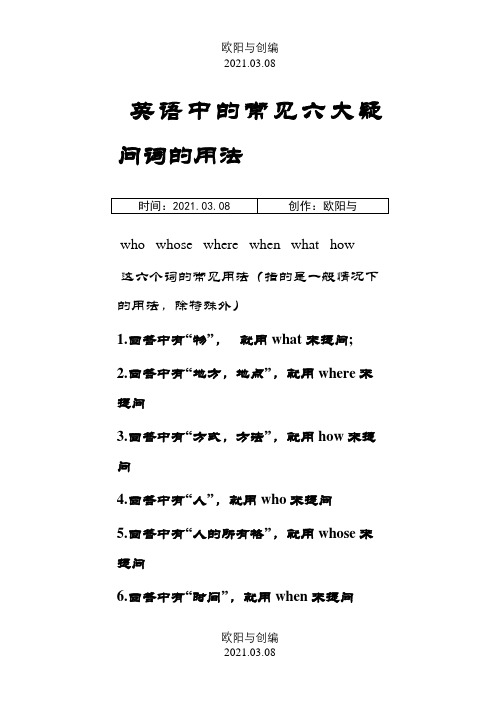
英语中的常见六大疑问词的用法who whose where when what how这六个词的常见用法(指的是一般情况下的用法,除特殊外)1.回答中有“物”,就用what 来提问;2.回答中有“地方,地点”,就用where来提问3.回答中有“方式,方法”,就用how来提问4.回答中有“人”,就用who来提问5.回答中有“人的所有格”,就用whose来提问6.回答中有“时间”,就用when来提问欧阳与创编以上这六种里最简单的为第四个。
就刚才所说六点现在举例说明如下:1. (What) are you going to take?2. (Where) are you from?Sandwiches,milk and cakes. I amfrom New York.3. (How) did you get there?4. (Who)is going to help me?I got there by train .Mike.5. (Whose) bag is this?6. (When) are you going to watch TV?Mike's bag is this. At eight o'clock.英语疑问词用法总结句子是英语学习的核心。
从句子使用的目的来分,它可分为四类1、陈述句(肯定句和否定句)2、疑问句(一般疑问句、特欧阳与创编殊疑问句和选择疑问句)3、祈使句(肯定句和否定句)4、感叹句。
四大句子类型的相互转换,对于学生来讲是个难点,为此,可通过说顺口留的形式来帮助学生解决这一难题。
如:将陈述句变成一般疑问句,可以变成这样的顺口留:疑问疑问调个头,把be(系动词“is are am”)放在最前头。
又如:将陈述句的肯定句变成否定句,我们就可以这样说:否定,否定加“not”,加在何处,加在系动词的后面;在句子相互转换的题型中,最难的要算“就下列划线部分提问”或是“看答句,写问句”这种题型了,其实,我们只要熟练掌握疑问词(what,what time, what colour, where,when, who, whose, which, how, how old ,how tall, how long, how big, how heavy , how much, how many等等)具体欧阳与创编用法,了解他们是针对什么提问的,这种题型就很容易做了。
英语疑问词的用法

英语疑问词的用法疑问代词:what 什么, which 哪一个, who 谁, whom 谁, whose谁的疑问副词:when 什么时间,where 什么地方,why 为什么,how 怎么样疑问形容词:what(which,whose)+名词一、what 什么用来问是什么,叫什么,做什么等1. What’s your name? 你叫什么名字?2.What is in your box? 你的盒子里是什么?3. What’s your father?=What does your father do? 你爸爸是干什么的?一)what time 什么时间用来问点时间What time is it? 几点了?二)what colour 什么颜色用来问颜色What colour is your bag? 你的书包是什么颜色?三)what about 怎么样用来征求意见或询问感受等,大多用于承接上面的同样问题。
1.What about this pair of shoes? 这双鞋子怎么样?2.What about you? 你呢?四)what day 星期几用来问星期几What day is it today/tomorrow? 今天/明天星期几?五)what date 什么日期问具体的日期What’s the date today? 今天是几号?What date is tomorrow? 明天是几号?二、when 什么时候用来问时间When do you get up?你什么时候起床?三、where 哪里用来问地点1. Where is my ruler? 我的尺子在哪里?2. Where are you going? 你打算去哪里?3.Where are you from? =Where do you come from? 你是哪里人?四、which 哪一个用来问具体的哪一个1. Which season do you like best? 你最喜欢哪个季节?2.Which class are you in? 你在哪一个班?3.Which one is my pen?哪一支是我的钢笔?五、who 谁用来问人物是谁1.Who is that boy?那个男孩是谁?2. Who are you going to go with? 你打算和谁一起去?3. Who is that pretty lady?那个漂亮的女士是谁?4. Who teaches you English?谁教你们英语?六、whose 谁的用来问东西是谁的1. Whose bag is this? 这是谁的包?2.Whose bike is yellow? 谁的自行车是黄色的?七、why 为什么用来问原因1.Why do you like spring? 你为什么喜欢春天?2. Why did you go there? 你为什么去那里?八、how 怎么样用来问方式或者询问身体等状况1. How are you? 你好吗?2. How is your mother? 你妈妈好吗?3. How did you come here? 你们是怎么来的?4. How did they finish the work so quickly?他们是如何这么快完成工作的?一)How old 几岁用来问年龄How old are you? 你几岁了?二)How long 多长(1) 用来问时间How long does the film last? 这部电影放多长时间?(2)用来问长度How long is the bridge? 这座桥有多长?三)How big 多大用来问物体的大小How big is your bedroom? 你的卧室多大?四)How tall 多高用来问高度How tall is your brother? 你弟弟有多高?五)How far 多远用来问路程How far is it from here? 从这儿去有多远?六)How many 多少用来问可数名词的数量How many apples do you have? 你有多少苹果?七)How much (1)多少用来问不可数名词的数量How much water is there in that bottle? 那个瓶子里有多少水?(2)多少钱用来问价格How much is this dress? 这个连衣裙多少钱?表格归纳对划线部分提问的语序对划线部分提问,除了要注意选择正确的疑问词外,还要注意语序的运用:1、对句子的主语提问,其语序是:疑问词+谓语+其他成分?(整个句子是陈述句语序)She is their teacher. Who is their teacher?主语谓语主语谓语2、对句子主语的定语部分提问,其语序是:疑问词+主语(即定语所修饰的名词)+ 谓语+其他成分?(整个句子是陈述句语序)My book is over there. Whose book is over there ?主语的定语主语谓语疑问词主语谓语以上两条方法都是:用正确的疑问词代替划线部分,再把句号改为问号,其余部分一般不做改变。
初中英语知识点归纳疑问词的用法区别

初中英语知识点归纳疑问词的用法区别疑问词在英语中扮演着非常重要的角色,用于提出问题或查询信息。
不同的疑问词有着不同的用法和区别。
下面将对常用的疑问词进行归纳并进行用法区别的介绍。
一、疑问词的分类疑问词可以分为以下几类:who, whom, whose, which, what, when, where, why, how等。
二、用法区别1. Who / WhomWho用于提问主语,Whom用于提问宾语。
例如:- Who is that girl?(那个女孩是谁?)- Whom did you see yesterday?(昨天你见到了谁?)在日常口语中,Whom的使用较少,通常会用Who来代替。
2. WhoseWhose用于询问所属关系,表示“谁的”,通常修饰名词。
例如:- Whose book is this?(这是谁的书?)- Whose dog is barking?(是哪只狗在叫?)3. WhichWhich用于从多个选项中进行选择。
例如:- Which color do you like? Red or blue?(你喜欢哪种颜色?红色还是蓝色?)- Which book do you want to read?(你想读哪本书?)4. WhatWhat用于提问事物或物品,通常修饰名词。
例如:- What is your favorite movie?(你最喜欢的电影是什么?)- What time is it?(现在几点了?)5. WhenWhen用于询问时间。
例如:- When is your birthday?(你的生日是什么时候?)- When will you finish your homework?(你什么时候会完成作业?)6. WhereWhere用于询问地点。
例如:- Where is the nearest hospital?(最近的医院在哪里?)- Where did you go on vacation?(你去哪里度假了?)7. WhyWhy用于询问原因或理由。
英语中的常见六大疑问词的用法之欧阳语创编
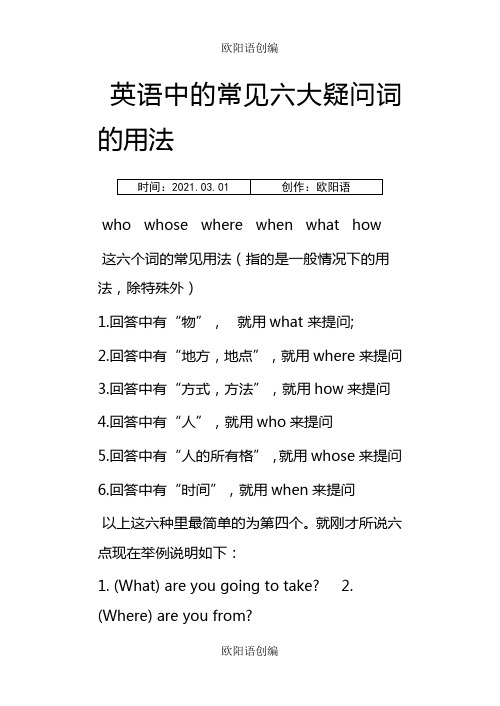
英语中的常见六大疑问词的用法who whose where when what how 这六个词的常见用法(指的是一般情况下的用法,除特殊外)1.回答中有“物”,就用what 来提问;2.回答中有“地方,地点”,就用where来提问3.回答中有“方式,方法”,就用how来提问4.回答中有“人”,就用who来提问5.回答中有“人的所有格”,就用whose来提问6.回答中有“时间”,就用when来提问以上这六种里最简单的为第四个。
就刚才所说六点现在举例说明如下:1. (What) are you going to take?2. (Where) are you from?Sandwiches,milk and cakes. I am from New York.3. (How) did you get there?4. (Who)is going to help me?I got there by train .Mike.5. (Whose) bag is this?6. (When) are you going to watch TV?Mike's bag is this. At eight o'clock.英语疑问词用法总结句子是英语学习的核心。
从句子使用的目的来分,它可分为四类1、陈述句(肯定句和否定句)2、疑问句(一般疑问句、特殊疑问句和选择疑问句)3、祈使句(肯定句和否定句)4、感叹句。
四大句子类型的相互转换,对于学生来讲是个难点,为此,可通过说顺口留的形式来帮助学生解决这一难题。
如:将陈述句变成一般疑问句,可以变成这样的顺口留:疑问疑问调个头,把be(系动词“is are am”)放在最前头。
又如:将陈述句的肯定句变成否定句,我们就可以这样说:否定,否定加“not”,加在何处,加在系动词的后面;在句子相互转换的题型中,最难的要算“就下列划线部分提问”或是“看答句,写问句”这种题型了,其实,我们只要熟练掌握疑问词(what,what time, what colour, where,when, who,whose,which,how,how old ,how tall, how long, how big, how heavy , how much,how many等等)具体用法,了解他们是针对什么提问的,这种题型就很容易做了。
高中英语知识点归纳疑问词的分类与用法

高中英语知识点归纳疑问词的分类与用法疑问词在英语中起着承上启下的作用,用于提问和获得信息。
了解疑问词的分类和用法对于高中英语学习非常重要。
本文将对常见的疑问词进行分类,并介绍它们的用法。
一、一般疑问词一般疑问词用于直接提问,通常以对句子的主语、宾语、地点、时间、方式、原因等进行询问。
1. Who(谁)Who用于询问人的身份、职业、姓名等信息。
- Who is your favorite singer?你最喜欢的歌手是谁?2. What(什么)What用于询问事物的性质、名称、数量等信息。
- What is the capital of France?法国的首都是什么?3. When(何时)When用于询问时间。
- When is your birthday?你的生日是什么时候?4. Where(哪里)Where用于询问地点。
- Where do you live?你住在哪里?5. How(如何)How用于询问方式、程度等信息。
- How do you go to school?你怎么去学校?二、特殊疑问词特殊疑问词用于引导特殊疑问句,通常以介词短语或从句的形式出现,用于询问具体的信息。
1. Which(哪一个)Which用于在有限的范围内进行选择。
- Which book do you prefer, Harry Potter or Lord of the Rings?你更喜欢哪本书,哈利波特还是指环王?2. Whose(谁的)Whose用于询问所属关系。
- Whose bag is this?这是谁的书包?3. Why(为什么)Why用于询问原因。
- Why are you late for class?你为什么迟到了?4. How much(多少,价格)How much用于询问价格或不可数名词的数量。
- How much does this T-shirt cost?这件T恤衫多少钱?5. How many(多少,数量)How many用于询问可数名词的数量。
英语疑问词的用法
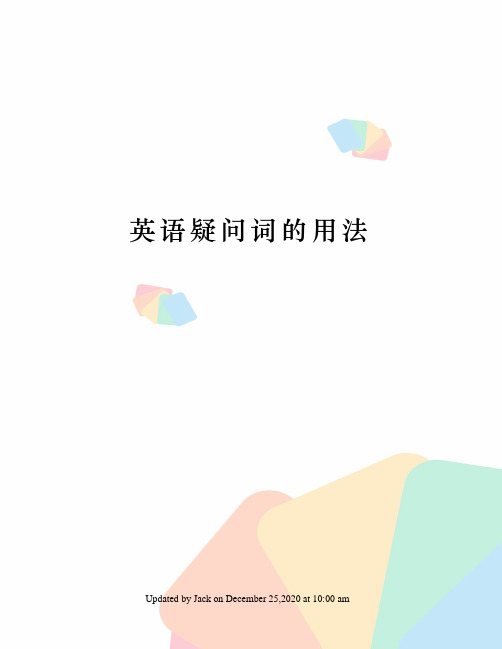
英语疑问词的用法 Updated by Jack on December 25,2020 at 10:00 am英语疑问词的用法疑问代词:what 什么, which 哪一个, who 谁, whom 谁, whose谁的疑问副词:when 什么时间,where 什么地方, why 为什么, how 怎么样疑问形容词:what(which, whose)+名词一、what 什么用来问是什么,叫什么,做什么等1. What’s your name 你叫什么名字 is in your box 你的盒子里是什么3. What’s your father=What does your father do 你爸爸是干什么的一)what time 什么时间用来问点时间What time is it 几点了二)what colour 什么颜色用来问颜色What colour is your bag 你的书包是什么颜色三)what about 怎么样用来征求意见或询问感受等,大多用于承接上面的同样问题。
about this pair of shoes 这双鞋子怎么样 about you 你呢四)what day 星期几用来问星期几What day is it today/tomorrow 今天/明天星期几五)what date 什么日期问具体的日期What’s the d ate today 今天是几号 What date is tomorrow 明天是几号二、when 什么时候用来问时间When do you get up你什么时候起床三、where 哪里用来问地点1. Where is my ruler 我的尺子在哪里2. Where are you going 你打算去哪里are you from =Where do you come from 你是哪里人四、which 哪一个用来问具体的哪一个1. Which season do you like best 你最喜欢哪个季节 class are you in 你在哪一个班one is my pen哪一支是我的钢笔五、who 谁用来问人物是谁is that boy那个男孩是谁 2. Who are you going to go with 你打算和谁一起去3. Who is that pretty lady那个漂亮的女士是谁4. Who teaches you English谁教你们英语六、whose 谁的用来问东西是谁的1. Whose bag is this 这是谁的包 bike is yellow 谁的自行车是黄色的七、 why 为什么用来问原因do you like spring 你为什么喜欢春天 2. Why did you go there 你为什么去那里八、 how 怎么样用来问方式或者询问身体等状况1. How are you 你好吗2. How is your mother 你妈妈好吗3. How did you come here 你们是怎么来的4. How did they finish the work so quickly?他们是如何这么快完成工作的一)How old 几岁用来问年龄 How old are you 你几岁了二)How long 多长 (1) 用来问时间 How long does the film last 这部电影放多长时间(2)用来问长度 How long is the bridge 这座桥有多长三)How big 多大用来问物体的大小 How big is your bedroom 你的卧室多大四)How tall 多高用来问高度 How tall is your brother 你弟弟有多高五)How far 多远用来问路程 How far is it from here 从这儿去有多远六)How many 多少用来问可数名词的数量 How many apples do you have 你有多少苹果七)How much (1)多少用来问不可数名词的数量How much water is there in that bottle 那个瓶子里有多少水(2)多少钱用来问价格How much is this dress 这个连衣裙多少钱表格归纳对划线部分提问的语序对划线部分提问,除了要注意选择正确的疑问词外,还要注意语序的运用:1、对句子的主语提问,其语序是:疑问词+谓语+其他成分(整个句子是陈述句语序)She is their teacher. Who is their teacher?主语谓语主语谓语2、对句子主语的定语部分提问,其语序是:疑问词+主语(即定语所修饰的名词)+ 谓语+其他成分(整个句子是陈述句语序)My book is over there. Whose book is over there主语的定语主语谓语疑问词主语谓语以上两条方法都是:用正确的疑问词代替划线部分,再把句号改为问号,其余部分一般不做改变。
高中英语知识点归纳疑问词的使用方法

高中英语知识点归纳疑问词的使用方法疑问词在英语中扮演着重要的角色,用于构建疑问句、请求信息等。
对于高中英语学习者来说,正确使用疑问词不仅有助于提高语言表达能力,还能协助理解和分析他人的问题。
本文将归纳总结常用的高中英语疑问词及其使用方法。
一、Wh- 问句:1. What:表询问事物或情况。
- What is your favorite color?(你最喜欢的颜色是什么?)- What time is it?(现在几点了?)2. Where:询问地点。
- Where do you live?(你住在哪里?)- Where is the nearest supermarket?(最近的超市在哪里?)3. When:询问时间。
- When is your birthday?(你的生日是什么时候?)- When will the concert start?(音乐会什么时候开始?)4. Why:询问原因或理由。
- Why are you late for class?(你为什么上课迟到了?)- Why did he quit his job?(他为什么辞职了?)5. Who:询问人。
- Who is the girl in the photo?(照片里的女孩是谁?)- Who is your favorite singer?(你最喜欢的歌手是谁?)6. Whose:询问所有权归属。
- Whose book is this?(这本书是谁的?)- Whose bag did you borrow?(你借了谁的包?)7. Which:询问选择或区分。
- Which pen do you prefer, the blue one or the black one?(你更喜欢哪支笔,蓝色的还是黑色的?)- Which team won the game?(哪个队赢得比赛了?)二、以How- 开头的疑问词:1. How:询问方式、程度等。
英语常用疑问词汇表

英语常用疑问词汇表摘要:一、前言二、英语疑问词汇的分类1.一般疑问词2.特殊疑问词3.选择疑问词三、各种疑问词的例句及用法1.一般疑问词2.特殊疑问词3.选择疑问词四、总结正文:【前言】英语中,疑问词是用来提问或询问信息的词汇。
了解和掌握疑问词的用法对于进行有效的沟通和交流至关重要。
本文将为您详细介绍英语中常用的疑问词及其用法。
【英语疑问词汇的分类】英语疑问词可以根据其提问方式和内容分为三大类:【一般疑问词】一般疑问词用于对某个陈述句的真实性或事实进行提问。
主要包括:1.Is(用于肯定句)2.Are(用于复数名词或be 动词)3.Do(用于其他动词)4.Did(用于过去时)5.Have(用于现在完成时)6.Has(用于第三人称单数)7.Will(用于将来时)8.Can(用于能力)9.Should(用于建议、责任等)【特殊疑问词】特殊疑问词用于对某个特定的事物、时间、地点、原因等进行提问。
主要包括:1.What(什么)2.Who(谁)3.Whom(谁,用作宾语)4.Whose(谁的)5.Which(哪个)6.Where(哪里)7.When(什么时候)8.Why(为什么)9.How(如何,怎样)【选择疑问词】选择疑问词用于对两个或多个选项进行选择性的提问。
主要包括:1.Or(或者)2.Or(还是)3.And(和)4.But(但是)【各种疑问词的例句及用法】【一般疑问词】1.Is this your book?(这是你的书吗?)2.Are you a student?(你是学生吗?)3.Do you like apples?(你喜欢苹果吗?)4.Did you go to the movies last night?(你昨晚去看电影了吗?)5.Have you finished your homework?(你完成作业了吗?)【特殊疑问词】1.What is your name?(你叫什么名字?)2.Who is the winner?(谁是冠军?)3.Whose car is this?(这是谁的车?)4.Which book do you like best?(你最喜欢哪本书?)5.Where are you from?(你来自哪里?)【选择疑问词】1.Do you want tea or coffee?(你想要茶还是咖啡?)2.Is your favorite color red or blue?(你最喜欢的颜色是红色还是蓝色?)【总结】英语中疑问词的种类繁多,但只要掌握好一般疑问词、特殊疑问词和选择疑问词这三大类,就能应对大部分的提问和回答场景。
【英语知识点】疑问词的用法

【英语知识点】疑问词的用法1.回答中有“物”,就用what来提问;2.回答中有“地方,地点”,就用where来提问;3.回答中有“方式,方法”,就用how来提问;4.回答中有“人”,就用who来提问;5.回答中有“人的所有格”,就用whose来提问;6.回答中有“时间”,就用when来提问。
一般疑问句由do\does\did\done(助动词)或am\is\are\was\were(系动词)或者can、may、must、should、would(情态动词)等引导。
如:1 Is this your pen?Yes it is./No it isn't2 I’m in Class 2, Grade 1. →Are you in Class 2, Grade 1? 你是在一年级二班吗?3 —Is this your English book?这是你的英语书吗?—Yes,it is. 是的,它是。
—No,it isn`t. 不,它不是。
4 —Can you spell your name?你会拼写你的名字吗?—Yes,I can. 是的,我会。
—No,I can`t.不,我不会。
特殊疑问句由what(询问事物), how much(询问价格), what time (询问时间,尤其是点钟), what kind of(询问种类), why(询问原因),who(询问人), where (询问地点)等特殊疑问词引导。
如:1 —What is this? 这是什么?—It's a key. 这是一把钥匙。
2 —How much is it? 这个多少钱?—It's twenty dollars. 二十美元。
3 —What kind of movies do you like? 你喜欢哪一类型的电影?—I like action movies. 我喜欢动作片。
4 What time is it?现在几点钟?5 Who is your teacher? 谁是你的老师?6 — What time is it, please? 请问几点了?— It's 7:30. 七点半了。
- 1、下载文档前请自行甄别文档内容的完整性,平台不提供额外的编辑、内容补充、找答案等附加服务。
- 2、"仅部分预览"的文档,不可在线预览部分如存在完整性等问题,可反馈申请退款(可完整预览的文档不适用该条件!)。
- 3、如文档侵犯您的权益,请联系客服反馈,我们会尽快为您处理(人工客服工作时间:9:00-18:30)。
英语中的常见六大疑问词的用法who whose where when what how这六个词的常见用法(指的是一般情况下的用法,除特殊外)1.回答中有“物”,就用what 来提问;2.回答中有“地方,地点”,就用where来提问3.回答中有“方式,方法”,就用how来提问4.回答中有“人”,就用who来提问5.回答中有“人的所有格”,就用whose来提问6.回答中有“时间”,就用when来提问以上这六种里最简单的为第四个。
就刚才所说六点现在举例说明如下:1. (What) are you going to take?2. (Where) are you from? Sandwiches,milk and cakes. I am from New York.3. (How) did you get there?4. (Who)is going to help me?I got there by train . Mike.5. (Whose) bag is this?6. (When) are you going to watch TV? Mike's bag is this. At eight o'clock.英语疑问词用法总结句子是英语学习的核心。
从句子使用的目的来分,它可分为四类1、陈述句(肯定句和否定句)2、疑问句(一般疑问句、特殊疑问句和选择疑问句)3、祈使句(肯定句和否定句)4、感叹句。
四大句子类型的相互转换,对于学生来讲是个难点,为此,可通过说顺口留的形式来帮助学生解决这一难题。
如:将陈述句变成一般疑问句,可以变成这样的顺口留:疑问疑问调个头,把be(系动词“is are am”)放在最前头。
又如:将陈述句的后面;在句子相互转换的题型中,最难的要算“就下列划线部分提问”或是“看答句,写问句”这种题型了,其实,我们只要熟练掌握疑问词(what,what time, what colour, where,when, who,whose,which,how,how old ,how tall, how long, how big, how heavy , how much,how many等等)具体用法,了解他们是针对什么提问的,这种题型就很容易做了。
英语中的一般疑问句怎么改?一调: 就是把助动词(do,does),be动词(is,am,are),情态动词(can)调到句首;二改: 就是把第1人称改为第2人称,动词的过去时或第三人称的单数形式恢复原形;三问号:变完以后在句末加问号。
一般疑问句概念:能用yes / no(或相当于yes / no)回答的问句叫一般疑问句。
大部分一般疑问句都应读作升调。
一般疑问句的三种构成形式1. 含系动词be的一般疑问句的构成具体地说,就是当陈述句中有am /is / are时,可直接将它们提至主语前,但如遇第一人称,最好将其置换成第二人称。
有时陈述句中的some还要变作any等。
如:(1).I’m in Class 2, Grade 1. →Are you in Class 2, Grade 1?——Yes,I am. /No,I am not.(不缩写)(2).They are student. →Are they student?——Yes,they are. /No, they aren’t.(3).He is helpful at home. →Is he helpful at home ?——Yes ,he is. /No,he isn’t.(4).There are some books on my desk.→Are there any books on your desk?——Yes ,there are. /No,there aren’t.2. 含情态动词的一般疑问句的构成一般疑问句面前人人平等:情态动词与am / is / are一样,也可直接将它们提至主语前就可以了。
(1).I can spell the words. →Can you spell the words?——Yes, I can. /No, I can’t.(2).We can sweep the classroom. →Can you sweep the calssroom?——Yes, we can. /No, we can’t.(3).He can water the flowers. →Can he water the flowers ?——Yes, he can. /No, he can’t.(4).She can clean the bedroom. →Can she clean the bedroom ?——Yes, she can. /No, she can’t.(5).They can set the table. →Can they set the table?——Yes, they can. /No, they can’t.3.含实义动词的一般疑问句的构成含实义动词的一般疑问句的构成稍微有点讲究,一般要在句首加do,如逢主语为第三人称单数,则要在句首加上does,谓语动词则要变回原形(如likes →like, has →have等)。
I like English. →Do you like English?——Yes, I do . /No, I don’t.She goes to school today. →Does she go to school today?——Yes, she does. /No, she doesn’t.He often watches TV on Saturdays.→Does he often watch Tv on Saturdays?——Yes, he does. /No, he doesn’t.They have lunch at school. →Do they have lunch at school?——Yes, they do . /No, they don’t.We sweep the floor every day. →Do you sweep the floor every day?——Yes, we do . /No, we don’t.1. be 的用法口诀我用am,你用are,is连着他,她,它;单数名词用is,复数名词全用are。
变疑问,往前提,句末问号莫丢弃。
变否定,更容易,be后not莫忘记。
疑问否定任你变,句首大写莫迟疑。
2. 时间名词前所用介词的速记歌年月周前要用in,日子前面却不行。
遇到几号要用on,上午下午又是in。
要说某日上下午,用on换in才能行。
午夜黄昏须用at,黎明用它也不错。
at也用在时间前,说“差”可要用上to,说“过”只可使用past,多说多练牢牢记,莫让岁月空蹉跎。
基数词变序数词歌基变序,有规律,词尾加上-th(fourth,sixth) ,一、的二、的三,特殊例,结尾字母t,d,d(first,second,third),八去t, 九去e,(eighth,ninth),ve要用 f替;(fifth,twelfth),ty将y改成i, th前面有个e。
连词成句一种题型有多种细微的差别。
1、带有标点符号的。
有的连词成句每个小题的后面给出所要连成的句子的标点。
比如用一个括号括上一个句号或问号,这就让做题者明白你所要连出的句子是陈述句还是问句。
如果是句号,就要在给出的单词中找出主语,比如I,you,she,he,it,they,this,that,these,those,there等,把它放在第一位,然后再去寻找动词,这里的动词可能是系动词,也可能是实意动词。
最后再找出宾语。
如果给出的是问号,我们就要迅速到句子中去寻找疑问词,疑问词可能是特殊疑问词,也可能是一般疑问句中的be动词或情态动词。
特殊疑问词常见的有what, where, when, how, how much, how many, how old. Be动词有is,am, are.情态动词有can, would, do等。
2、不带标点符号的这里又不得不分成两类来说。
一类是给出单词中有一个是首字母大写的。
那代表着那个单词是这个句子的第一个单词。
如果给出的单词中有两个是首字母大写的,那说明其中有一个是人名或地名,是在任何时候都必须大写的。
那么就一定要找到这个必须大写的,把它排除在外,让另一个单词做这个句子的第一个单词。
然后,再按照第一点里面写的步骤去完成整个句子。
另一类,就是没有给出句子的第一个单词,那么,我们就只能直接在句子中寻找可能作为第一个单词的单词。
如果没有给出明显的疑问代词,那么就按照陈述句处理就可以了。
名词复数的规则变化序号构成法例词.1 一般情况下,词尾加-s book -- book s bed -- bed s2 以s,x,ch,sh结尾,分别读[s][ks][t∫][∫]的词,词尾加-es,读[iz]bus -- bus esbox -- box esdish -- dish eswatch -- watches3 以f或fe结尾,读[f]的词,先将f或fe改成v,再加-es,读[vz]。
kni fe -- kni veswi fe -- wi ves4 以辅音字母加y结尾,先将y改i再加-es,读[iz]。
famil y -- famil iescit y -- cit ies5 以o结尾的单词,有生命的物质加-es,无生命的物质加-stomat o -- tomato esphot o -- photo s【下载本文档,可以自由复制内容或自由编辑修改内容,更多精彩文章,期待你的好评和关注,我将一如既往为您服务】。
